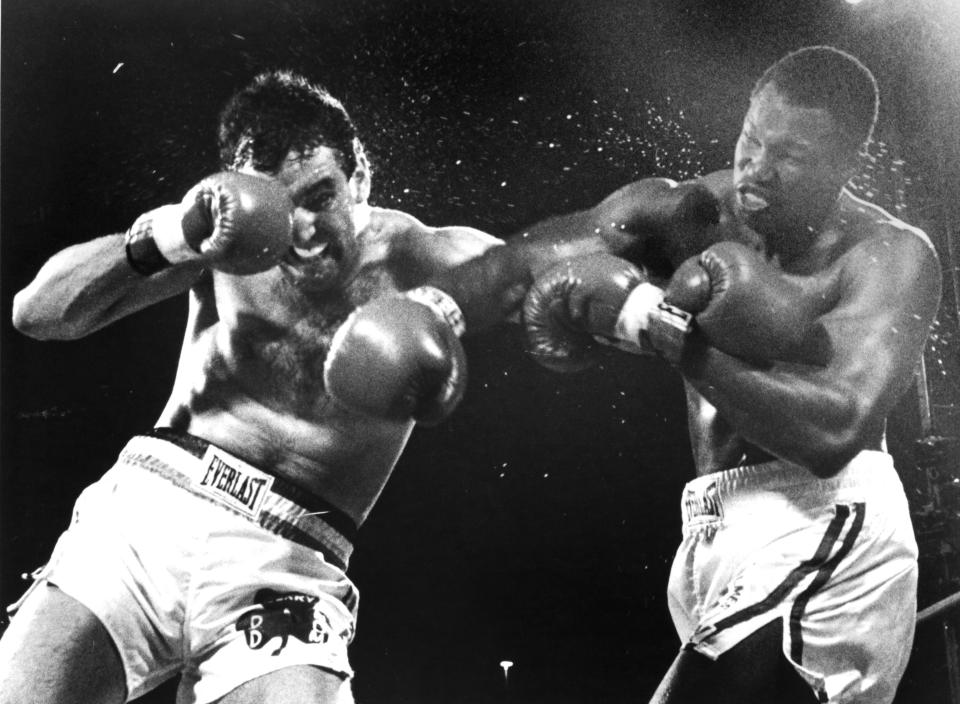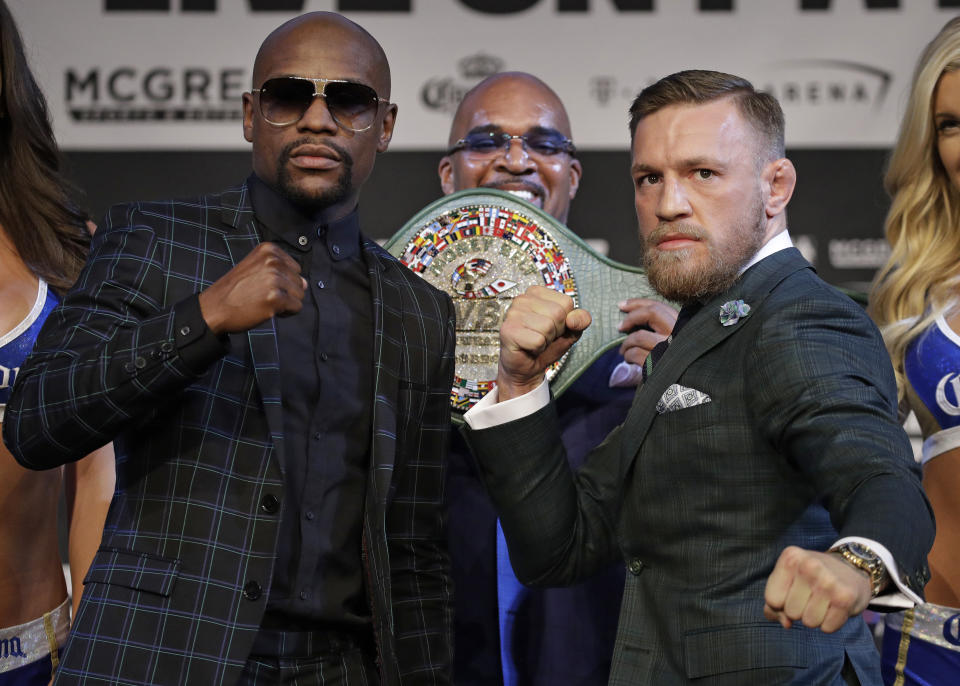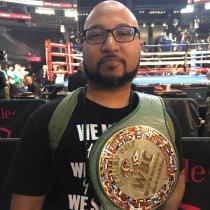Mayweather-McGregor reignites the uncomfortable topic of race in boxing
On June 11, 1982, Larry Holmes and Gerry Cooney competed in one of the most memorable fights in boxing history. But it was dominated by an angle that neither fighter went looking for.
Race.
Holmes was the African-American heavyweight champion who was trapped underneath the massive shadow of Muhammad Ali. Undefeated with a record of 39-0, “The Easton Assassin” sought respect but struggled mightily for the recognition he deserved with his mild-mannered temperament and blue-collar work ethic.

Cooney, an Irish-American, was also unbeaten with a record of 25-0 and represented “The Great White Hope” as the boxing world was devoid of a white world heavyweight champion for over two decades at that point. He was the Rocky Balboa story personified and garnered a strong (read: white) following as he rumbled through the division with his vicious left hook, charming smile and overall welcoming demeanor.
Race became a significant part of the promotion thanks to promoter Don King and Cooney’s manager, Dennis Rappaport, when they realized they could milk the controversy and create a financial windfall by exploiting the topic, even though both Holmes and Cooney did their best to avoid broaching the subject.
Unfortunately, race in America was — and still is — an inescapable topic that brings out the worst in people. A racially charged promotional tour piqued public interest but also gnawed at Holmes, who had been heavyweight champion for four years to that point but was treated almost as if he was the B-side in the fight. He lashed out in interviews at his distaste for “The Great White Hope” and his annoyance bubbled to the surface when he found out Cooney would be nearly splitting the $20 million purse despite being untested against anybody in Holmes’ class.
”If he weren’t white, do you think he’d be here, getting the same money as me?’’ Holmes said according to a 1982 New York Times story.
King and Rappaport were only happy to pour gasoline on the growing racial fire as tensions heightened to the point where Holmes was receiving death threats in the weeks leading up to the fight. But the only color that King and Rappaport saw was green, and casting a racial blanket over the fight only drew more public interest. By the time the two stepped into the ring on that June night in Las Vegas, the fight had become the then-richest in boxing history. Holmes won by 13th round TKO, putting to rest the idea of “The Great White Hype” and turning away a legion of his backers.
***Thirty-five years after their racially charged clash comes a fight with striking similarities, albeit not as overtly about race as the heavyweight showdown three and a half decades earlier.
On Saturday in Las Vegas, Floyd Mayweather, the unbeaten and boisterous African-American pound-for-pound champion, is coming out of retirement to face UFC lightweight champion Conor McGregor, a white Irishman that is getting the opportunity of a lifetime despite this being his first professional boxing match. The fact that a fight between an African-American and a white Irishman will likely smash all box office and pay-per-view records cannot be chalked up to coincidence.
The perceived mismatch — the greatest boxer of this generation competing against essentiality an amateur — has been equated to a spectacle and a money grab more than a competitive athletic event.
As the promotional tour for Mayweather-McGregor began, the racial framework was established and similarities between this fight and the racially charged heavyweight showdown of 1982 seeped into the narrative.
Like Cooney, McGregor has a tremendous left hand that wowed fans. But also like Cooney, his opportunity has been deemed as undeserved. McGregor is also full-blooded Irishman, where Cooney was Irish-American, with a sharp tongue and quick wit that is promotional gold. In many ways, McGregor is similar to Mayweather but devoid of the melanin. Perhaps the most telling aspect of how race influences the narrative is the notion that McGregor has to opportunity to make nine figures in his first professional boxing match.
As the tour rolled along, the two fighters churned out expletive-filled insults that garnered heavy public interest. But the racial dynamic started to bust through the seams. McGregor delivered his fair share of racially insensitive comments that ranged from asking Mayweather to dance for him to suggesting that he was black “from the bellybutton down.” Mayweather fired back in an ESPN interview by stating that he would be fighting for “all the blacks around the world.” McGregor was cheered at every stop during the tour while Mayweather was vehemently jeered.

But as the fight draws near, both fighters shrug off any thoughts that race has played a factor in this fight.
“Race isn’t a factor in any of this,” Mayweather Promotions CEO Leonard Ellerbe said Tuesday after Mayweather refused to answer a question about race.
This is a far cry from Mayweather’s statements to ESPN when he inexplicably said that “this fight is black and white” after suggesting that the two fighters are treated differently by the public because of the color of their skin.
“You take Floyd Mayweather — flamboyant, flashy, outgoing, outspoken — you know what they say? ‘He’s cocky, he’s arrogant, he’s unappreciative.’ But then we take Conor McGregor, takes my whole blueprint … and they praise him.”
It’s evident that the comments were merely to garner more interest in the fight by using controversy and race as a vehicle to drive up sales. Although the racial card has been used and cast aside by Mayweather or McGregor, once the bullet is out of the gun, you cannot take it back. With the recent tragedy in Charlottesville creating a platform to once again address race in America, the controversial nature of how race has played a role in this fight is simply inevitable.
UFC welterweight champion Tyron Woodley, who has been outspoken about the dynamics of race in both society and combat sports, believes that while race is certainly an element of the fight, it has been used primarily for promotional purposes.
“I think there are certain things Conor did that I figure they had to have some type of agreement where they could say whatever they wanted to each other,” Woodley told Yahoo Sports. “Otherwise, I don’t think Conor would have patted Floyd on the head, been in his face or made any of those comments. It’s a fight and I didn’t take away anything personal.”
Although he’s an advocate for African-American fighters speaking out on social issues, he believes that this fight is a mutual agreement between two parties to do whatever it takes to sell tickets. And, for that, he refuses to be sucked into the racial vacuum that was created.
“This fight is just about entertainment,” Woodley said. “There are so many other things in this world we can be upset about so we should give this fight a pass. We want to see the WWE in a boxing ring but we also want to tell them how they should promote the fight. When you have two guys who are known as entertainers first, I think everything was fair game.”
While he may be correct in his assessment, there is certainly proof that race played a role in this fight long before it was made.
Mayweather – for some reasons that are his own – has been cast as or played the role of villain during his rise to the top. Rather than be a likeable champion, he created the character of a fighter who was brash, disrespectful and eager to show off his earnings in the most obnoxious of ways. Although African-Americans may have initially groaned at Mayweather feeding the stereotype, it was box office gold. He has toned that character down quite a bit over the years but he’s still booed heavily in many circles. Some of that is his own doing considering his domestic issues that have plagued his career.
McGregor has harnessed much of that demeanor and applied it the UFC, but hasn’t been criticized nearly as much. He remains one of the most popular fighters the sport has ever seen.
If race is a factor, McGregor is not interested in participating in that narrative.
“It’s certainly something I do not condone,” McGregor said.
Cooney explained to Yahoo Sports that he never asked to be involved in a racial angle when he fought Holmes but was sucked into the controversial narrative as the promotion wore on.
“There was an ugliness in 1982 where I really didn’t like [Holmes],” Cooney said.
He felt that the heavyweight champion’s comments on Cooney getting the opportunity because of the color of his skin was a low blow but realized that both he and Holmes were pawns in the game that King and Rappaport were playing. Today, he and Holmes are great friends who put everything behind them once the bell rang in Las Vegas on that hot June night.
Cooney believes that unlike he and Holmes, Mayweather and McGregor have a lot more control over their narrative and will be friendly with each other afterward.
“These guys are not prejudice,” Cooney told Yahoo Sports.
He acknowledges the similarities between the upcoming fight and his clash with Holmes 35 years earlier, but chalks much of it up to promotion and entertainment.
“After you go on a nationwide promotional tour, you get tired of hearing the same questions over and over again,” Cooney said. “Your patience will get short and you’ll say stupid things sometimes. And those things will get stretched it into something else. But when these two fight, there will be no racism involved.”
Unfortunately, whether the fighters believe it or not, race will always be a factor when it comes to boxing as it can be used as a promotional tool to provoke casual fans into purchasing a fight they may have otherwise not been interested.
But as long as Mayweather and McGregor embrace, regardless of the outcome, cooler heads will prevail.
Related coverage from Yahoo Sports:
• How Mayweather-McGregor fight should play out
• Clause in McGregor’s contract could prove costly
• Mayweather guaranteed to make $100M vs. McGregor
• How a $750K bet made Mayweather a $1B fighter
• Las Vegas facing disaster if McGregor actually wins



